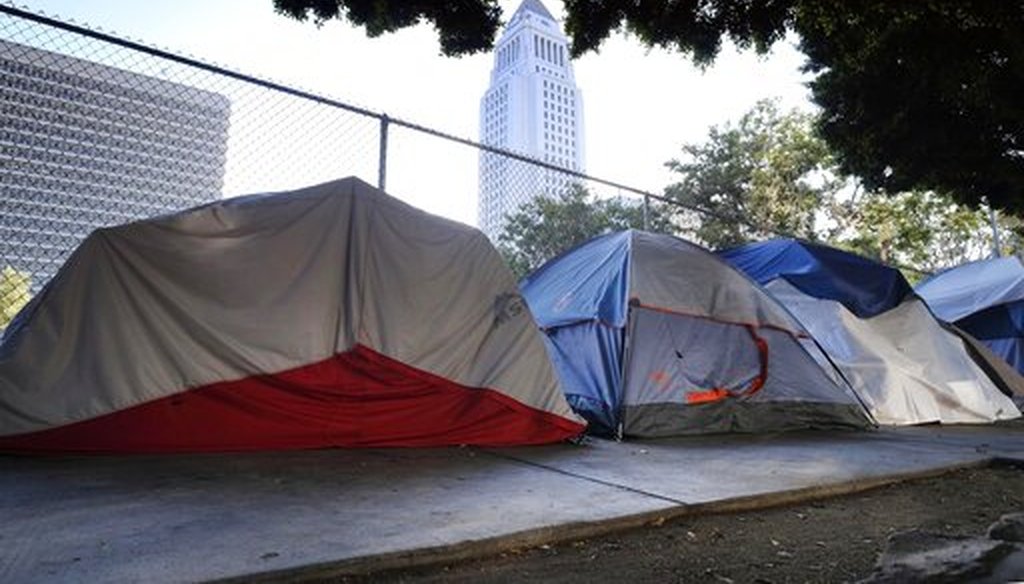Get PolitiFact in your inbox.

Los Angeles City Hall is seen behind a homeless tent encampment along a street in downtown Los Angeles on July 1, 2019. (AP/Vogel)
No, homeless people are not immune from catching COVID-19.
If Your Time is short
- Facebook post says homeless people are somehow immune from the coronavirus.
- Homeless shelters in cities across the country are dealing with outbreaks of the virus.
- People experiencing homelessness are also more likely to have pre-existing health conditions, which also makes them higher risk.
Amid the coronavirus crisis, there has been much talk about immunity, including how long those who have had COVID-19 may be immune from getting it again.
But what if there was a particular group of people who had natural immunity to the virus?
If you go to Facebook, you might believe it is true.
Here is one post, from April 21, 2020, that appears to have originated in California.
"Homeless line the streets in Cali, no bathing, washing hands, showering, clean clothes, little medical attention, no sanitizers, yet they aren’t piling up dead on the side of the street like logs," the post said. "How are they so immune?"
It includes a photo of an encampment, where dozens of homeless people are living in close quarters.
Among the comments on the post: "That's been on my mind this whole time, if it's so contagious and deadly then why aren't they dropping like crazy?"
And: "Yup and people still believe this is about a virus."
The post was flagged as part of Facebook’s efforts to combat false news and misinformation on its News Feed. (Read more about our partnership with Facebook.)
So, that prompted us to dive in.
Are the homeless somehow immune from the coronavirus?
In a word: No.
Homeless populations more susceptible to virus
Homelessness is a big problem across the country.
In 2018, there were more than 552,000 people experiencing homelessness on a single night in America, according to the National Alliance to End Homelessness. In California alone, where this post originated, estimates show there are nearly 130,000 homeless people.
And, contrary to the Facebook claim, homeless shelters in cities across the country are dealing with outbreaks of the virus.
In a study done by the U.S. Centers for Disease Control and Prevention in four cities -- Seattle, Boston, San Francisco and Atlanta -- out of 1,192 residents tested at shelters, 25% were positive. As for employees of the shelters, out of 313 people tested, 11% tested positive.
People experiencing homelessness are also more likely to have pre-existing health conditions, which also makes them higher risk, according to the CDC.
For instance, physical health problems, mental health problems and substance abuse issues -- or a combination of some or all of those -- can make it harder for the body to defend itself against the virus.
In addition, because of the conditions those experiencing homelessness face -- from living in close quarters to being unable to readily wash hands -- they are at a higher risk, according to a fact sheet from the National Alliance to End Homelessness.
A COVID-19 factsheet from the group notes those over the age of 65 are more likely to become ill from the virus. Those who experience long-term homelessness tend to track the same health conditions as senior citizens, but at a younger age.
It can also be difficult for the homeless to maintain social distancing due to crowded shelters, according to an April 2, 2020 report from Wired.com. And when shelters reach their capacity, many are forced to sleep outside.
In Milwaukee, those experiencing homelessness are able to take refuge at the Saint Francis de Sales Seminary, where 110 rooms were set up to isolate those with coronavirus symptoms from those who are at high risk of contracting the virus, according to a March 29, 2020 Milwaukee Journal Sentinel report. Plans called for those staying at the seminary to receive three meals a day and be checked on by members of the National Guard and the Milwaukee Health Department.
"Most places do not have easily accessible health care (for the homeless), and then there are people who for many reasons are not going to rush to speak to any authorities -- police, medical, social service, etc. -- because of issues like mental health, addiction, criminal background or just plain suspicion," said David Wagner, an emeritus professor of social work and sociology at the University of Southern Maine, in an email to PolitiFact Wisconsin.
"I think that (COVID-19 infection) rates are generally going to be higher, if anything, among the homeless than the housed."
Our ruling
A post making the rounds on Facebook claims homeless populations are immune to COVID-19.
Not only is there no basis for this claim -- or claiming that any group has natural immunity to a virus that emerged just months ago -- the reality says otherwise.
A CDC study of shelters in four major cities found that 25% of those tested were positive. In addition, tests of workers at the shelters came back with 11% positive.
We rate the claim Pants on Fire.
Our Sources
The National Alliance to End Homelessness, "State of Homelessness," accessed April 30, 2020
The Center for Disease Control and Prevention, "Homelessness and COVID-19 FAQs," accessed April 30, 2020
The National Alliance to End Homelessness, "Population At-Risk: Homelessness and the COVID-19 Crisis,’ accessed April 30, 2020
Wired.com, "For Homeless People, COVID-19 Is Horror on Top of Horror", published April 2, 2020
Email exchange with David Wagner, Emeritus professor of social work and sociology at the University of Southern Maine, April 30, 2020
Browse the Truth-O-Meter
More by Laura Schulte
No, homeless people are not immune from catching COVID-19.
Support independent fact-checking.
Become a member!
In a world of wild talk and fake news, help us stand up for the facts.





















































